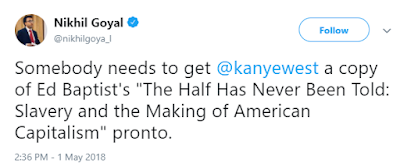Sad news. John was both an excellent economic historian and a really nice guy. Below is the text of the email about his death from EH.net. He will be missed by many people and in many ways.
John Murray, Joseph R. Hyde III Professor of Political Economy and Professor of Economics at Rhodes College, passed away on March 27, 2018 in Memphis, TN at the age of 58.
He was born on April 9, 1959 in Cincinnati, and became the first member of his family to attend college. He worked at a variety of jobs to pay his tuition, including phlebotomist, house painter, roofer, and ice cream vendor, graduating in 1981 from Oberlin College with a degree in economics. He later added an M.S. in mathematics from the University of Cincinnati, and the M.A. and Ph.D. in economics from The Ohio State University, where he wrote his dissertation under the tutelage of Rick Steckel.
John taught high school math before pursuing his graduate work in economics. After finishing at Ohio State, he accepted a position at the University of Toledo, where he remained for 18 years before accepting the Hyde Professorship at Rhodes College in 2011.
He had a lifelong penchant for learning, spending a summer studying the German language in Schwabish Hall in 1984, and summers as an NEH scholar in Munich in 1995 and at Duke in 2013. He also spent 2009-10 studying Catholic theology and philosophy at the Sacred Heart Major Seminary in Detroit.
Murray was the author of two books and co-editor of a third. The most recent, The Charleston Orphan House: Children’s Lives in the First Public Orphanage in America, published by the University of Chicago Press in 2013, was the recipient of the George C. Rogers, Jr. Prize, awarded by the South Carolina Historical Society for the best book on South Carolina history. His first book, Origins of American Health Insurance: A History of Industrial Sickness Funds (Yale University Press, 2007) was named one of ten “Noteworthy Books in Industrial Relations and Labor Economics” in 2008 by the Industrial Relations Section, Princeton University.
He published book chapters, monographs, encyclopedia and handbook contributions, and numerous articles in refereed journals including the Journal of Economic History, Explorations in Economic History, and Demography. His clear, crisp writing style and ability to explain complicated economic concepts made him a frequent choice to write for the popular press as well.
His research interests were varied. His most recent work centered on coal mine safety, post bellum African-American labor supply, and families in 19th century Charleston. He published extensively in the areas of the history of healthcare and health insurance, religion, and family related issues from education to orphanages, fertility, and marriage, not to mention his work in anthropometrics, labor markets, and literacy.
He was a scholar and a teacher, who believed deeply in the value of a liberal arts education, arguing that “a rigorous education, based on the traditional great books, teaches students great things—compassion for others in the human condition, the value of striving for greatness, the need for self-awareness, and humility in those efforts.” He won awards for his teaching at Ohio State and Toledo.
He was the director of the Program in Political Economy, a rigorous interdisciplinary major at Rhodes College. He taught a variety of economic history courses, including courses on demography and economic development, as well as mathematical economics, freshman calculus, introductory statistics, and econometrics. Then on the weekend he donated his time to his local parish, teaching Sunday School.
He was also generous with his time on a professional level, frequently reviewing books, and serving as the Book Review editor for the Journal of Economic History from 2014-16. He was a member of the editorial board of four journals: Explorations in Economic History (2008-15), the History of Education Quarterly(2016-19), Social Science History (1996-98 and 2006-14), and theJournal of Economic History since 2015. He served as the Associate Editor of Social Science History from 2001 to 2006.
He was a trustee for the Cliometric Society and served on its Program Committees, and was active in the Social Science History Association, holding numerous positions. He also served on numerous university committees at both Rhodes College and the University of Toledo.
More than a respected academic and award-winning author, John was a devoted husband and proud father. As impressive as his professional accomplishments were, his career always came second to his family. Conversations with John would eventually lead to family, and hearing him talk about them left no doubt about his true passion.
John is survived by his wife Lynn and their twin daughters.



